Android Ice Cream Sandwich has made its first appearance in Google’s fragmentation numbers for the platform. Android 4.0.x is now running on less than 1% of all devices that have accessed the Android Market in the last two weeks, coming in at 0.6% overall.

Meanwhile, Gingerbread continues to climb the charts. Android 2.3.x is now running on 55.5% of all devices, up 4.9% from a month ago. Froyo still commands about a third of the Android landscape, dropping precisely what Gingerbread gained at 4.9%, down to 30.4%. The biggest question for Android heading into the new year is: who gets Ice Cream Sandwich updates and when will the carriers and OEMs push them out?
If you are looking to see if your Android is going to get ICS, PCWorld has a great running list that it has been updating here. You can also check the some of the OEMs that have update pages to see when upgrades become available. Motorola currently does not have any devices that are currently ICS. Currently, the only devices running the newest version of Android are the Samsung Galaxy Nexus (the ICS flagship device) and some Nexus S devices running on GSM standards. Older versions of the Nexus line may or may not eventually see official updates.

Samsung is not going to bring ICS to all its Android devices. As of Dec. 20, the only devices scheduled for Android 4.0.3 were the Galaxy S II, Galaxy S II LTE, Galaxy Note, Galaxy R, Galaxy Tap 10.1, 8.9 and 7.7 as well as the Tab 7.0 Plus.
There have been arguments recently about the “openness” of Android because consumers do not know when or if they will be getting updates. It has been said that the lack of Android updates is part of the business model for the platform from the OEMs and the carriers. While that is frustrating for consumers, it is not a bad strategy for the companies in question that are trying to make money off of Android devices. This comes down to the “clopen” argument espoused by MarketingLand’s Danny Sullivan earlier this week.
In discussing “clopen” recently on Google+, James Wester, the editor for Mobile Payments Today, had this thought on the entire Android ecosystem:
“The whole thing comes across as one big equivocation fallacy. The argument seems to run: Google says Android is ‘open.’ I define ‘open’ differently from Google. Therefore, Android is not ‘open.’ I keep telling myself that I must be missing something.”

It brings up a good point. How open Android is a matter of subjectivity. A group of mobile industry insiders surveyed by analyst Chetan Sharma said that Google was, by far, the most “open” player in the mobile ecosystem. Android may not be as open as something like Linux, but in comparison to the other players such as Microsoft, Research In Motion, Nokia, Android is much more open.
Does that mean you will be seeing your ICS update any time soon? Probably not. The nature of the open Android ecosystem is that the carriers and OEMs can do more or less what they want with the platform. Different companies have different interests and strategies. Like it or not, that is the current state of the Android environment.
Are you content on using your current flavor of Android until it is time to buy a new device that has Ice Cream Sandwich or are you chomping at the bit for the newest iteration of the platform? Let us know in the comments.








